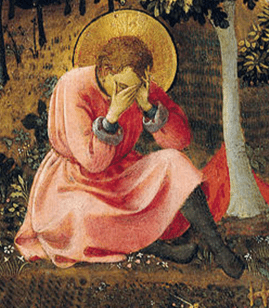Few thinkers in the history of civilization have had so wide an influence as St. Augustine of Hippo. It would be impossible to pay him proper homage in one article. Thus, we will dedicate the next several articles to this saint and doctor of the Church. The only born child of Patricius and Monica, he grew up in North Africa during a time of prosperity in the Roman Empire. As a young boy, he was influenced greatly by his peers and father, all of whom were pagans. Despite his mother’s constant admonitions, he never took her promptings seriously and had even less respect for her Catholic faith seeing it as naïve and boring. Monica would pray for over 25 years asking God to bring her son to the Church. In his teenage and young adult years, Augustine lived a life of vanity, superficiality and debauchery. He was very smart, an outstanding public speaker, a fiery debater and a cunning philosopher. When the young African moved to Rome, he became even more renowned for his skills and immediately fell prey to the pleasures his fame could afford him eventually fathering a child with his mistress. In his own words, he had only one delight, “to love and be loved…[but] I could not distinguish the white light of love from the fog of lust. Both love and lust boiled within me and swept my youthful immaturity…in a whirlpool of abominable sins”. As Augustine’s public success grew, his interior life waned leaving him with feelings of emptiness and dissatisfaction. No matter how many people he debated or how much he sought to find an answer for the meaning of existence in the sciences and philosophies of secular society, nothing seemed adequate; nothing could answer the deepest questions of his humanity. It was at this time Augustine met the man who would open his eyes and change the course of his life and in so doing, alter the course of world history. Augustine decided to take a position as a professor of rhetoric in the city of Milan where a bishop named Ambrose resided. Unlike some of the Catholics Augustine had met in his life, Ambrose was a man of profound intellectual prowess. The bishop spoke about religion and the scriptures in a way that Augustine could never have imagined. Furthermore, Ambrose’s rationality and eloquence were on par with any of the great orators Augustine had heard in Rome. Soon enough, Ambrose and Augustine began a series of intense discussions, the old bishop often leaving the young philosopher with sentiments of awe. This would lead to a moment of conversion in Augustine’s life. Maybe there was something more to Christianity after all…


